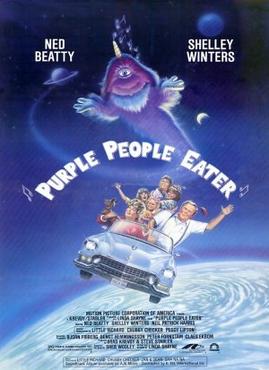Well he came down to earth and he lit in a tree,This is one of the first posts I wrote when I started this blog, but it never really felt finished it. So it sat un-posted and forgotten until recent events inspired me to finally post it. It still feels unfinished.
I said "Mr. Purple People Eater, don't eat me!"
I heard him say in a voice so gruff:
"I wouldn't eat you cuz you're so tough."
Purple People Eater is a song is about a "One eyed, one horned, flying purple people eater" that came to Earth to start a rock 'n roll band, and it goes a little something like this:
I said Mr. Purple People Eater, what's your line?According to these lyrics, the purple people eater eats purple people. This indicates that you or I should be safe (though this guy is pretty much screwed), and that Mr. Purple People Eater will most likely be pretty hungry on a planet without purple people (like ours). This is not how most people interpret it, including the creators of the 1988 Purple People Eater Movie:
He said, "Eating purple people, and it sure is fine."
Once you know to look for it, ambiguity is everywhere: Is a "big, bad dog catcher" a catcher of big, bad dogs, or a dog catcher that's big and bad? Is Dr. Seuss's book about ham and green eggs, or green eggs and green ham? Is Clifford a big, red dog, or a Big Red dog [foot note 2]? What does Candice mean when she asks for an X-Ray of a Kangaroo with three legs?
 |
| LEFT: An X-Ray (of a Kangaroo with three legs) RIGHT: An X-Ray of a Kangaroo (with three legs) |
Is this strange ambiguity unique to English, or do other languages get bogged down by purple people eaters as well? I asked around, and here is a short summery of my results:
Language
|
Ambiguity?
|
Phrase
|
English
|
Yes.
|
Purple People Eater
|
Cantonese Chinese
|
No.
|
1. 紫色食人物
2. 食紫色人的物體
|
Mandarin Chinese
|
No.
|
1. 紫色食人者
2. 食紫色人者 |
Spanish [3]
|
Yes.
|
Comedor de gente purpura
(Alternatively: Come gente purpura) |
Greek
|
Yes.
|
Ο άνθρωπος που τρώει μωβ άνθρωποι
|
German
|
No.
|
1. Lila Menschenfresser
2. Der Ungeheuer frisst lila menschen 3. Der lila Ungeheuer frisst menschen |
Albanian [4]
|
Yes.
|
Njerzit ngjyrë manushaqe ngrënës
|
-Nick
Footnotes:
[1] Here the parenthesis are being used to group words, not to indicate a parenthetical statement.
[2]
 |
| Hooray Puns! |
[3] My Spanish speaking friend points out a bonus ambiguity: "Purpura" is neither masculine or feminine, so if "purpura" describes the eater, then it's unclear whether the eater is male or female.
[4] My Albanian friend's handwriting is not fantastic, so there may be some errors


I love this! Semantics are crucial to communication! Especially if you are a purple People!
ReplyDelete